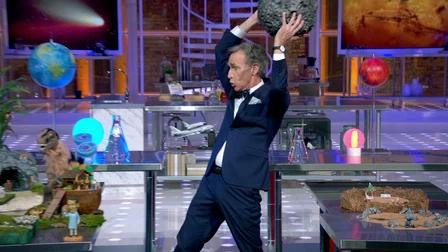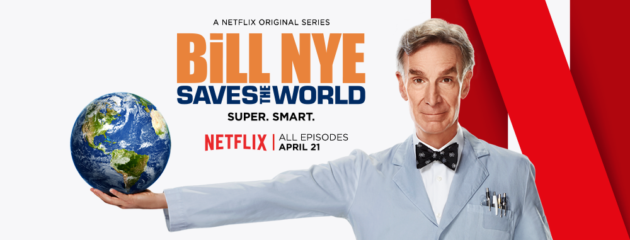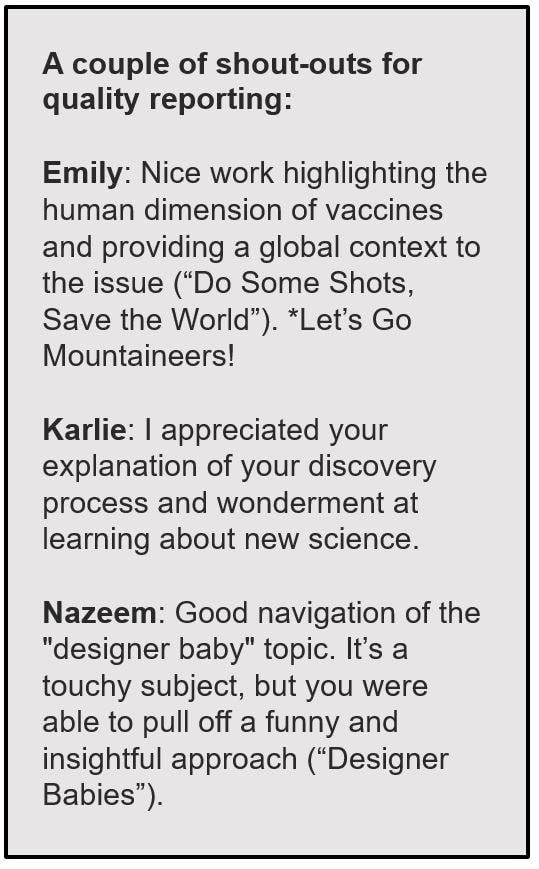Dear Bill Nye and company,
I’ve wanted to write about your new show “Bill Nye Saves the World” for some time now. I am a huge fan of your old show ("Bill Nye the Science Guy," 1993-1998). It was original, engaging, and inspired scientific curiosity in a whole generation.
Your new show is obviously targeting a different audience and has a very different tone and approach.
To be honest, upon watching the first few episodes, I was immediately turned off.
Demonstrations are still awesome, but you miss teaching opportunities.
|
My favorite part of the show was that, just like your original show, the simple experiments that demonstrate big concepts are fantastic!
In the “Earth Is a Hot Mess” (climate change) episode, you show that heating a liquid causes it to expand, and that adding CO2 to water changes the acidity. |
Bill Nye in "Earth is a Hot Mess," image from IMDB.
|
It's hard to follow your experimentation because we don't know the end goal or why it's important. Why should we care? (Besides the fact that experiments are COOL.) Your show has the potential to instill a scientific way of thinking to a broad audience! Promoting the application of the scientific method in daily life would do wonders for our society.
Facts aren't what people are missing.
You have also made the same mistake that many scientists do: assuming that just providing the right information will convince people. Unfortunately for scientists, this "deficit model" does not work.
Instead, try starting with the problem and talk about what we value before explaining the fallacies (like in TruTV's “Adam Ruins Everything”). If you want to connect with folks outside of the scientific and science-friendly communities, you need to work through their motivations and values, not blatantly tell them they're wrong and this is why. If you take a more nuanced approach as you did in the “Sexual Spectrum” (gender/sexuality) episode, I feel like you’ll have much greater success connecting to a diverse audience.
Your negativity is a turn-off-- literally.
Initially, your tone was too aggressive and accusatory. Research shows that negative messages aren't as effective as positive/neutral ones, especially for the public. By poking political jokes and telling us we're wrong, you are instantly taking sides and shutting out those who think differently from you.
Now, if your target audience is like-minded folks, they'll see you as a hero spreading the good word. But if your target audience is the very skeptics you demonize, they’ll “switch channels.”
Perhaps avoid drawing a line in the sand between scientists and non-scientists. Try emphasizing scientific thought as a means of addressing problems (like you did in the “Sexual Spectrum” episode).
I thought your tone in the “More Food, Less Hype” (GMO) episode was spot-on. You identified with the values of audience members who are skeptical of GMOs and explained your personal journey to discover the truth. By identifying with the values of others, you can better communicate your message. In the episode, Derek (of Veritasium) appropriately references why folks can have legitimate fears of scientists messing with things (e.g. DDT, lead). This is a terrific way to draw your audience in as they are now compatriots in the struggle to learn the truth and make informed decisions.
I really enjoyed hearing from the correspondents. However, there was one critical piece missing. Let them tell their story. Each one of them has had an incredible journey to get them where they are today. What's their background? How did they get into science in the first place?
|
Not everyone's path is a straight road. For instance, Derek has posted on Veritaserum a very moving and heartfelt story about his journey through science. I feel like each one of your correspondents has a story to tell. This could contribute to reducing the perceived disconnect between scientists and non-scientists.
Along those lines, I really appreciated when the correspondents talked with real people and listened to their stories. Empathizing with the bookseller in Venice (“Earth is a Hot Mess”) or the blind person working with Microsoft (“Machines Take Over the World”) are an effective means of humanizing the grand problems we face. You "Need a Minute," but maybe you shouldn't take a minute. I am not a fan of the "Need a Minute" portion of the show. |
A possible twist on this segment is have your "Need a Minute" be more like the “Earth’s People Problem” episode where you open yourself up to the audience about how the topic has affected you personally and how you and your family are dealing with it. This is a great way to connect with your audience as everyone can identify with being an American trying to succeed and live a healthy, productive life.
Don't rig your panels.
In the beginning of the show, your panels were cringe-worthy. You set up the contrary person to fail. It felt eerily similar to putting a "crazy liberal" on a panel on Fox News to represent all liberals and demonize them. I think that it’s important to have a contrary opinion, but there must be a more tactical way to approach this.
I was really impressed with the diverse panel for the “The Original Martial Invasion” (life in the universe) episode as well as the episode on vaccines (“Do Some Shots, Save the World”). They were friendly, casual, and informative. Additionally, there were all-female panels on the show! It passes the Bechdel–Wallace test!
I was also pleasantly surprised to hear from the “Earth’s People Problem” panel about the social justice aspect of in-vitro fertilization (due to the cost of the procedure). Same with population control. It's really important to bring these to light!
Don't claim to save the world.
Lastly, the title, “Bill Nye Saves the World” confused me for the whole show. Who are you saving the world from? Misconceptions in science? Fairly abstract.
People doing things wrong? Accusatory.
I think you need to be careful about playing the blame game, as scientists have gotten things wrong, too (DDT; lead).
Also, folks who propagate misconceptions might interpret your show as an attack on their intellect and turn it off. This is likely everyone, as we all have misconceptions about something going on in our world (myself included).
Overall, a mixed review. The first few episodes were jarring, while the middle and end episodes were much more empathetic and thoughtful. The premise of the show is noble, connecting science to everyday lives while simultaneously making it sound cool and exciting (such as the “walking across coals” experiment). Good luck in future episodes!
Sincerely,
A fan of science and science communication,
Nate Emery
P.S. nice shout out to ultimate frisbee in the “Do Some Shots, Save the World” episode!




